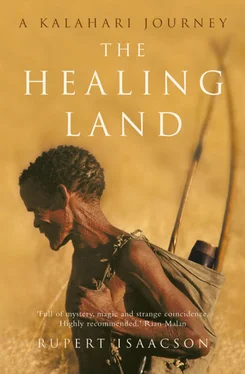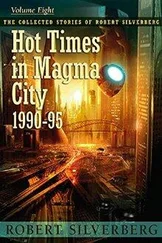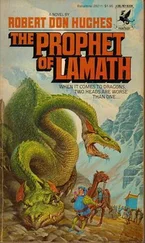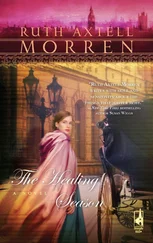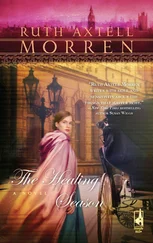She told us how, sometime in the middle of the last century, a party of white farmers in the Drakensberg mountains of South Africa had gone to hunt down the last group of Bushmen living in their area. Having seen all the game on which they had traditionally relied shot out, the Bushmen had resorted to hunting cattle and the farmers had organised a commando, or punitive raid against them. After the inevitable massacre up in the high passes, a body was found with several hollowed-out springbok horns full of pigment strapped to a belt around his waist. ‘He was the last Bushman painter,’ said my mother.
Laurens van der Post, whose writings in the 1950s established him as a Bushman guru, included this poignant story in his Lost World of the Kalahari. In his version it is one of his own forebears who went out on a similar raid, sometime in the late nineteenth century, in the ‘hills of the Great River’. Someone in his own grandfather’s family (van der Post’s words), having taken part in the massacre, discovers the body of the dead artist. Over the years I have encountered this story again and again, from the mouths of liberal-minded whites and in books, each time with a different location and twist. Perhaps all of them are true. Like so much that concerns the Bushmen and the great, wide land that used to be theirs, the story has become myth – intangible, impossible to pin down. Irresistible to a small boy of eight.
Back in the grey, drearily ordinary city of my birth, I found that the bright continent had worked its magic on me. I became more curious about our origins, about the dynastic lines going down the generations, and began to quizz my parents on more detail.
Though from vastly different origins and cultures, both sides of the family had gone at the great continent like terriers; yapping, biting and worrying away at it until they had established themselves and become white Africans. On my father’s side were the Isaacsons and Schapiros, poverty-stricken Lithuanian Jews who had emigrated from the small villages of Pojnewitz and Dochschitz (pronounced Dog-Shits) in the early 1900s. They had gone first to Germany, then to the emerging colony of German Southwest Africa, now Namibia, where my grandfather Robbie had been born in 1908. He grew up poor; his father worked at a low-paying job as a fitter on the railways while his mother kept a boarding house in the small capital Windhoek (though one family rumour has it that she was sometimes a little more than a landlady to her male guests).
The German colony was too rigidly anti-Semitic to allow Jews to make easy fortunes. So, on reaching his twenties, my grandfather crossed the great Kalahari, travelling through British Bechuanaland (now Botswana) to Rhodesia, where, after a brief spell selling shoes, he managed to land a job as a trainee auctioneer in a firm owned by another Litvak Jew – one Herschel (known as Harry) Schapiro. There followed a machiavellian rise to fortune: my grandfather courted and married Freda, daughter of this man Schapiro, became head auctioneer, began slowly buying up farms that came to the company cheap and, eventually, took over the firm.
Harry Schapiro himself had a more romantic story. While still a young man in Lithuania he had abandoned his wife Minnie (a notoriously difficult woman, according to my father) and set off into the world to make his fortune. He took a ship to England, intending to go from there to America, but – owing to his lack of English – got on the wrong boat and ended up in Port Elizabeth, just as the Boer War broke out. * With characteristic opportunism, he enlisted in the Johannesburg Mounted Infantry believing that once the war was over they would be demobbed in the Transvaal – where the gold mines were. Harry spent three years tramping up and down central South Africa without seeing a shot fired. Then, when the Armistice came, the regiment was demobbed not in the mine fields as promised, but back in Port Elizabeth where Harry had started from.
Undaunted, he set out for the Transvaal anyway, only to end up, not a mining magnate as he had hoped, but a butcher in the mine kitchens, where his wife Minnie managed to track him down, having travelled all the way from Lithuania to do so. Harry stayed with her just long enough to sire Freda (Robbie’s wife and my father’s mother, who died from Alzheimer’s while my sister and I were still small), before running away again, this time to Rhodesia, where he graduated from butcher to cattle trader to wealthy owner of a livestock auctioneering house. Minnie, no less resourceful, tracked him down a second time, whereupon he capitulated, though she of course never forgave him.
My father remembered Minnie – by then an old woman – drinking champagne by the gallon and forcing Harry to buy her a neverending stream of expensive gifts – Persian rugs, Chinese vases and the like – which she would then sell, banking the money. Because, she claimed, she never knew when her husband might take it into his head to disappear again. During these latter years she developed delusions of grandeur and used to tell my father that she had married beneath her, having spent her girlhood in a Lithuanian palace. ‘Rubbish, Minnie,’ Harry would harrumph from his armchair, ‘you were born in a hovel.’
My father’s side was successful financially, my mother’s side less so. But the Loxtons were made of epic stuff. My mother’s father Allen, for example, after spending an idyllic boyhood riding his horse Starlight across the rolling green hills of Natal, became a journalist, then a tank soldier in the 8th Army during the war in North Africa. He escaped his burning tank at Tobruk and jumped onto an abandoned motorbike just as the Afrika Korps came running over the dunes. On his return from the war, Allen resumed his career as a journalist, roving all over southern Africa as a feature writer for the Sunday Times and Johannesburg Star. My mother showed us great fat binders full of his cuttings – stories of travels with crocodile hunters, with witch doctors, with Bushmen; the black and white pictures and Boys’ Own language (at which he excelled) conjuring a world of adventure that stood out in stark contrast to the world I knew in London.
No less intrepid, his wife – my grandmother Barbara – also went to the war, putting my mother (then aged three) and aunt (aged five) into a children’s home and roaming the Western Front as a freelance war artist for the South African papers. As with Allen’s cuttings, my mother would show us Barbara’s paintings, which were kept in a big leather trunk in our sitting room. Barbara had painted everything she saw: London families sleeping in the Underground during the Blitz; the Battle of the Bulge, with the American dead lying in the snow of the Ardennes, cut down like wheat by the German Tiger tanks; the blood-spattered agony of the military hospitals; civilians starving on the streets of the Hague. Shortly after Berlin fell, she and a group of other journalists were allowed into Hitler’s eyrie, high in the Bavarian Alps, literally days after the great dictator and his mistress Eva Braun had committed suicide. Barbara rifled the desk drawers and brought back a few of Hitler’s personal effects – minor things like photographs, an Iron Cross or two, and some official documents – to pass on to the children. My sister and I felt proud that my mother’s parents had taken part in this great story.
But the Loxtons paid for their adventurous spirit by being heavy drinkers, prone to irrational rages, and subsequent wallowing remorse. Allen was no exception, and drove Barbara to leave him a few years after their return from the war. The effect on my mother and her sister Lindsay was far-reaching. Once she left Allen, Barbara (who seems to have been kind, but emotionally cool) never had her children to live with her again. Having been put into boarding schools as near infants while their parents went adventuring, they experienced but a brief couple of years of family life before being shunted off once more, to grow up in institutions until they reached university age.
Читать дальше
